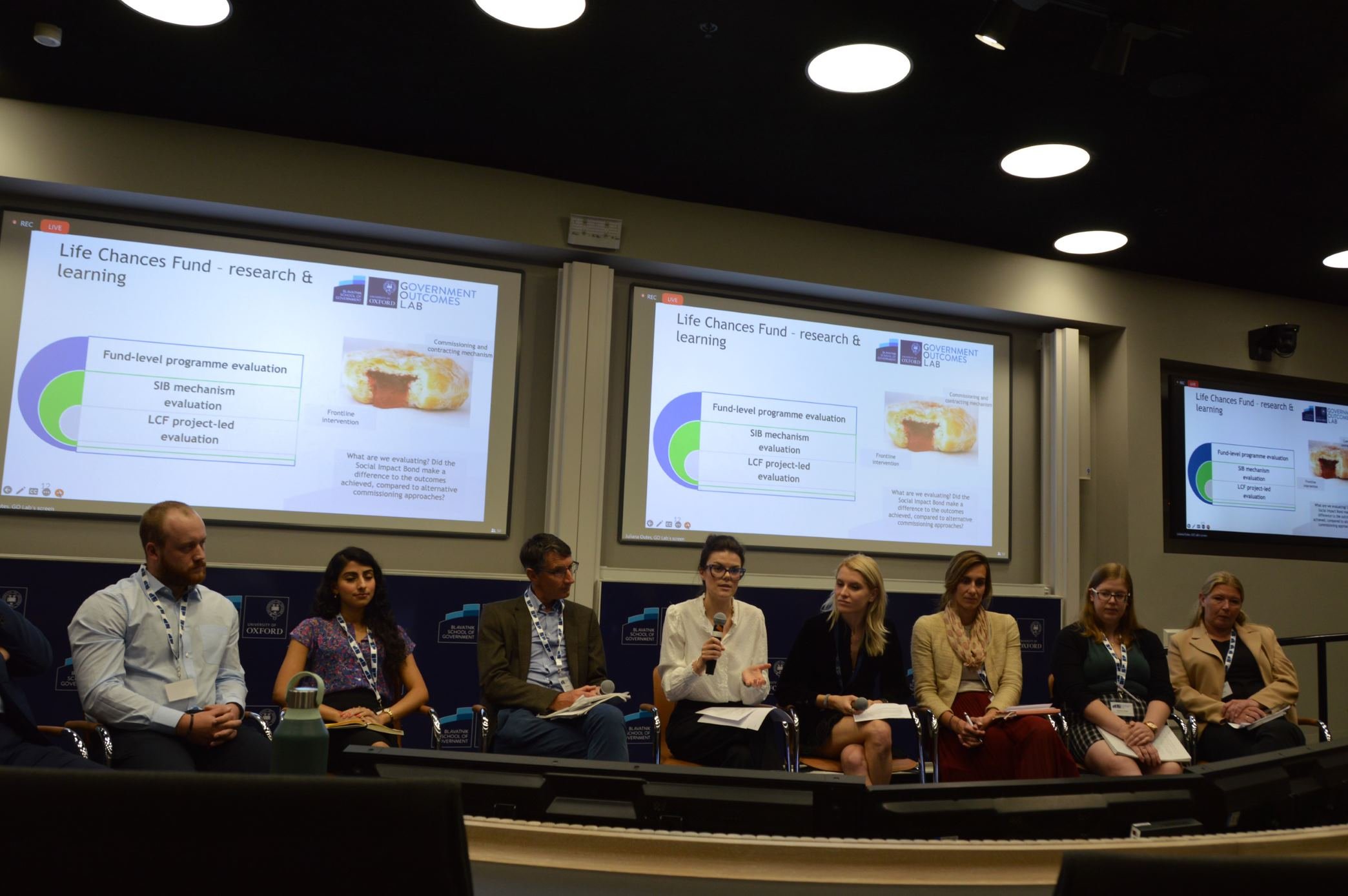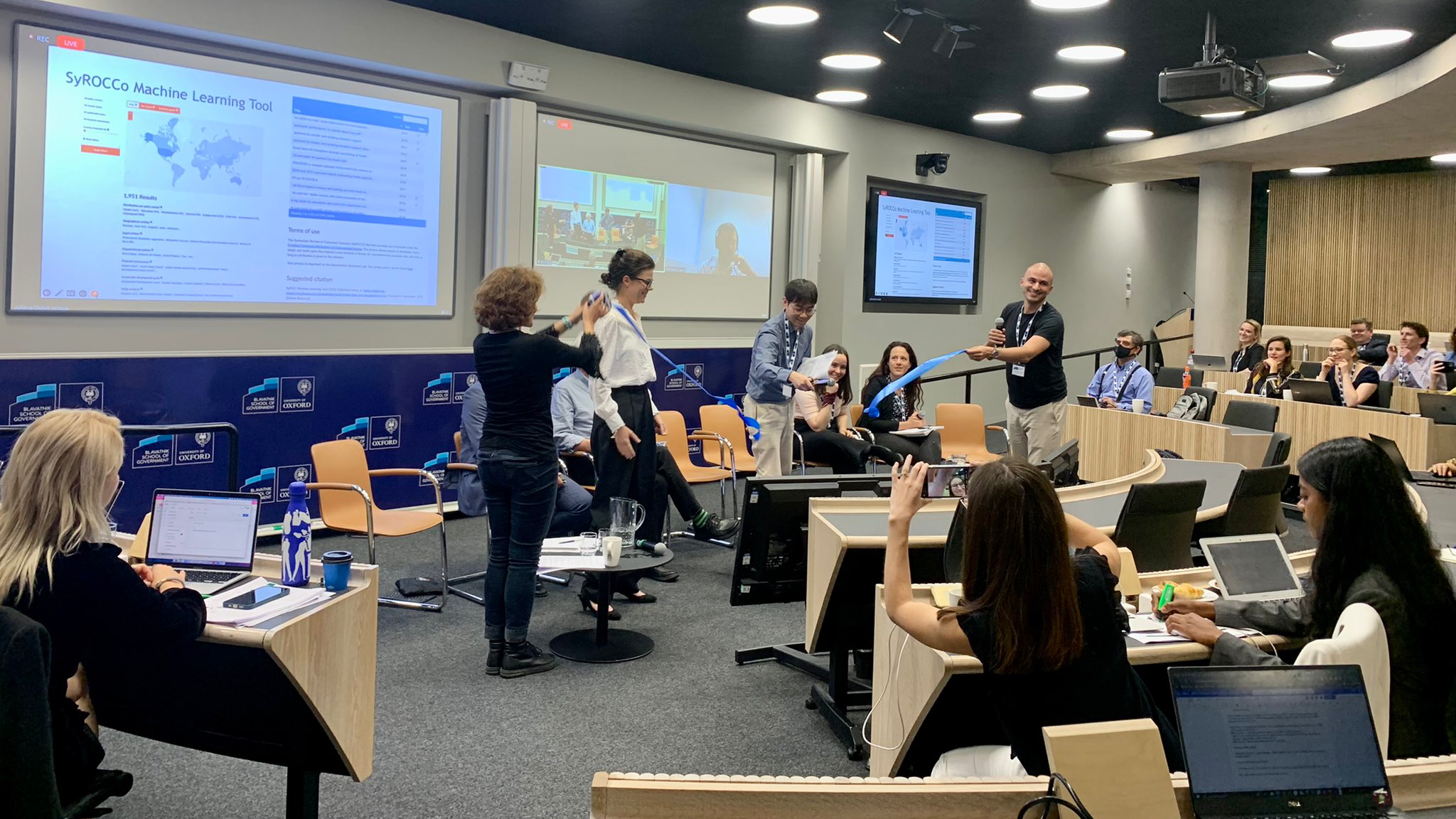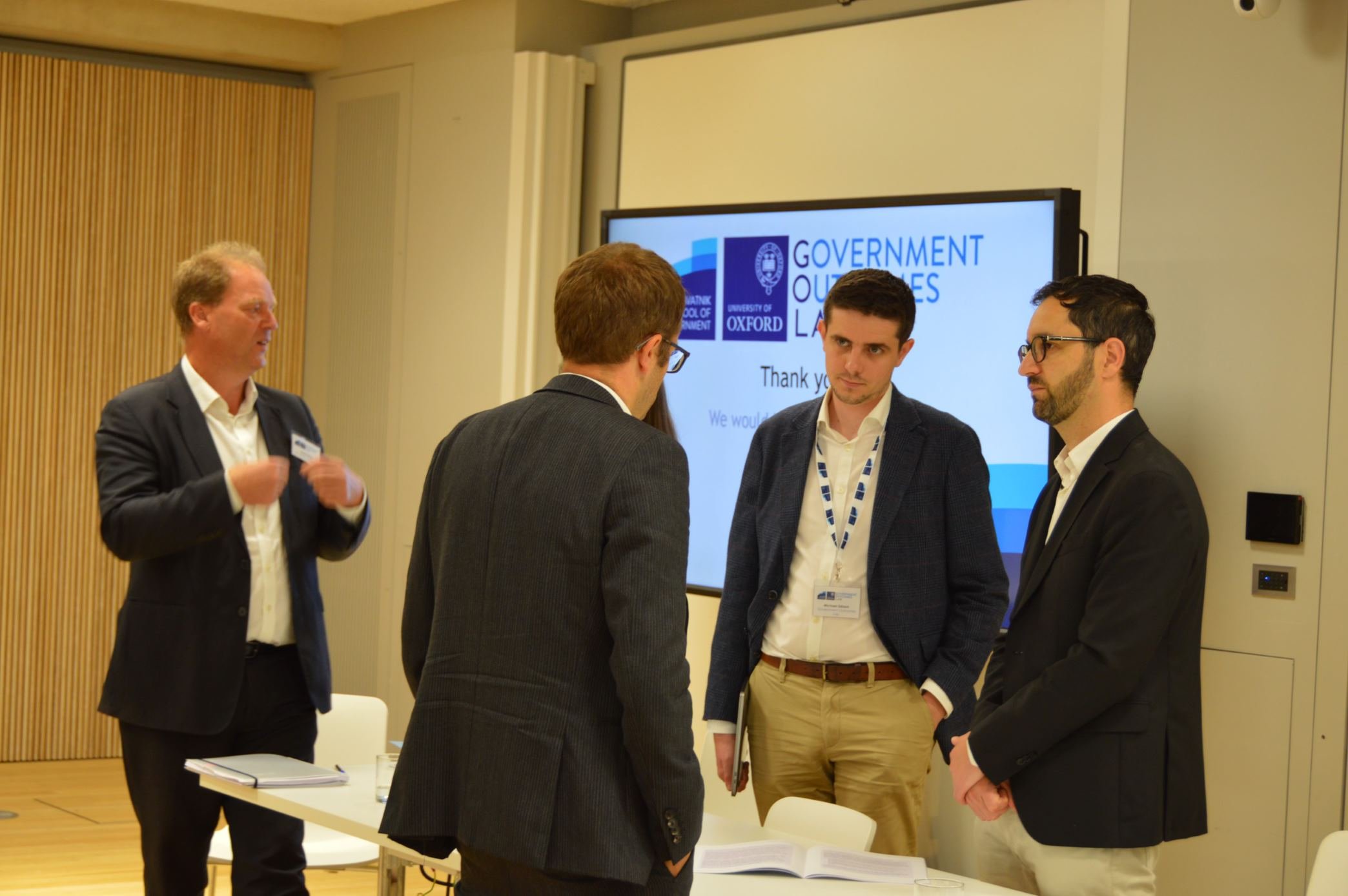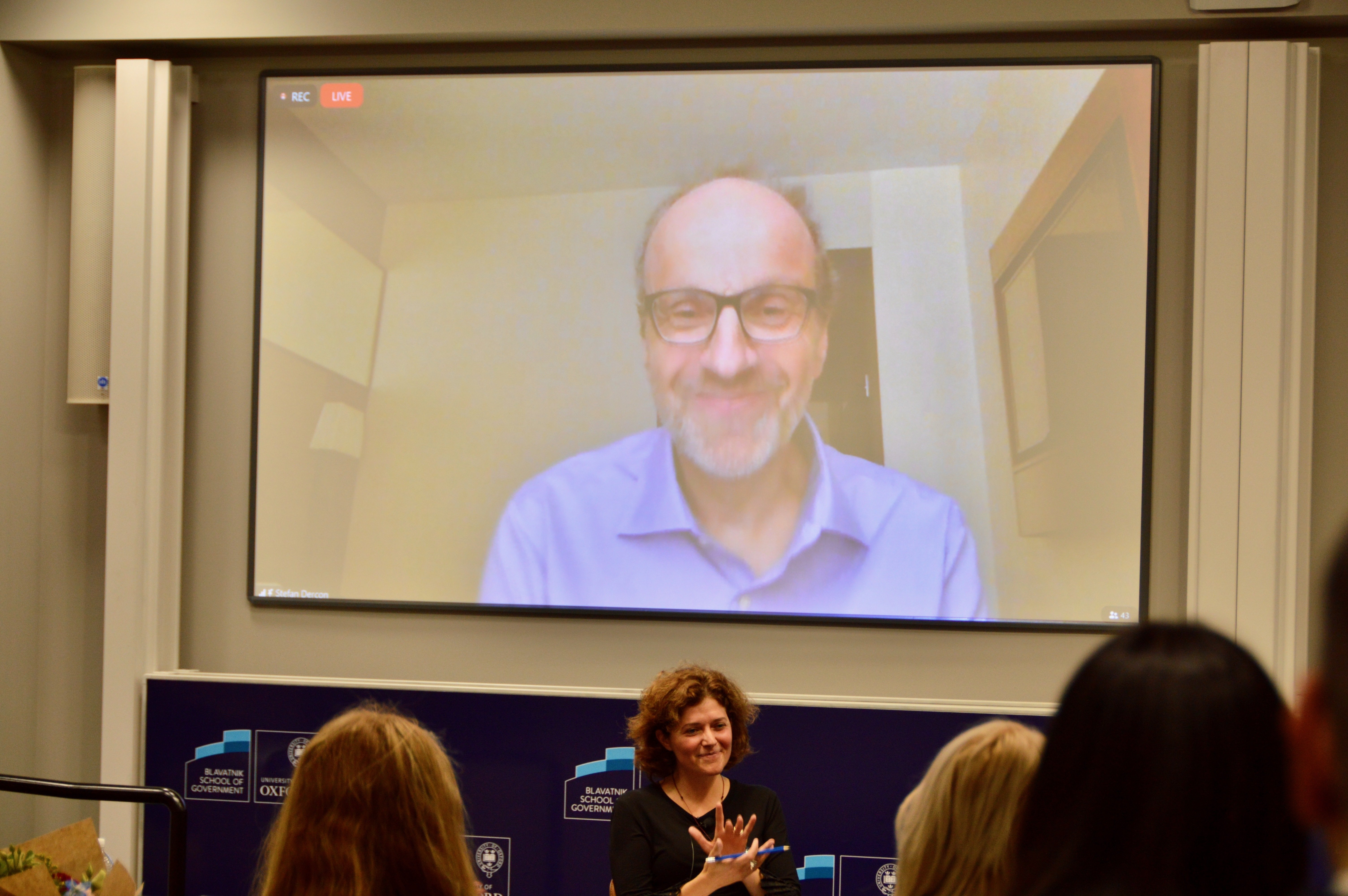Highlights from Day 2 of SOC22
Here's an overview of all the sessions and the recordings for Day 2 of the hybrid Social Outcomes Conference 2022.
Here's an overview of all the sessions and the recordings for Day 2 of the hybrid Social Outcomes Conference 2022.
Thank you to everyone who joined this year's Social Outcomes Conference. We have been blown away by the excellent quality of discussions over the last few days. The GO Lab team are delighted have met so many of you in-person and to have engaged in insightful conversations with those attending online. This year, we welcomed more than 115 speakers from 22 countries. We were delighted to have over 160 participants attending in person, with hundreds more joining us online. We hope to see you again next year for SOC23 on 14-15 September 2023.
Academic Symposium
We kicked off the jam-packed day with an academic symposium on governance & institutional logics in outcomes-focused partnerships. The session was chaired by GO Lab's Dr Eleanor Carter, who navigated the conversation around the various tensions of institutional logics and how these might be mitigated within a SIB partnership. Alec Fraser, from King's College London, emphasised the necessity of asking ourselves whether or not in the long term 'institutional learnings' will remain? When discussing the role of governance and leadership in mediating different institutional logics, Franziska Rosenbach (GO Lab) argued for leadership as crucial to enabling a pluralistic approach.
Listen to the audio recording of the session.
Roundtables
The conference continued with two concurrent roundtables. In the first session, we had an adventure through the progress of the Life Chances Fund, celebrating what the projects have achieved so far, reflecting on lessons learnt and exploring how these achievements can be sustained beyond the life of the impact bond. We heard a range of presentations. As the panel discussed challenges, Emma Hanley (Kirklees Council) highlighted the specific challenge around how we might realise cost savings. Russ Wood (Latitude Network) responded to Hanley's point: 'Excellent questions about realising cost savings, Emma. Australian Treasury officials will often say that they 'won't be able to close a prison' as a result of a successful SIB'

Listen to the audio recording of the session.
The second roundtable looked at measuring what matters in outcomes-based partnerships, welcoming contributions from across the globe including from Japan, to New Zealand, to Sweden and a range of other countries. The Chair, Nigel Ball (GO Lab) opened the session by considering balancing robustness and practicality in measuring programmes. Adriana Balducci (Education Outcomes Fund), drawing from her experience conducting an internal benchmark study, explored the limitations of quasi-experimental methods in terms of both methodologies and practices (no reliable database in place, or, if they do exist, they lack transparency, making it difficult to isolate the right variables). Prof Gary Painter (University of Southern California) added that some methodologies may be robust, but not always appropriate. There was much discussion around the significance of a 'relational' approach in defining outcomes, particularly foregrounded by Seini Jensen and Debbie Sorensen (Pasifica Futures), who talked about the need for a 'cultural change' within the whole process to 'shift away from top-down ways of defining outcomes', and instead towards community led processes and co-designed outcomes.
Listen to the audio recording of the session.
Big picture - Data with a purpose: Insights from an emerging learning collaborative for outcomes-based partnerships
After a short break, we started our first big picture session of the day. The Government Outcomes Lab & our partners at Warwick University launched SyROCCo - the Systematic Review of Outcomes Contracts - Collaboration - a pioneering tool to support practitioners, policymakers and researchers to find the right evidence on outcomes-based contracts.
In the first part of the session, we discussed the challenges of data sharing in the field of outcomes-based contracting and how the development of a global network of data stewards can help unlock more data, insights and learnings. The speakers agreed on the idea that data can add value to our work if we can make sense of it and generate insights. We presented our new SyROCCo machine learning tool in the second part of the session, after GO Lab Research Director Eleanor Carter asked our panel: “What would good evidence-based policymaking look like in the world of social outcomes contracting?” This new tool offers a solution, allowing researchers, practitioners and policymakers to navigate a huge volume of evidence on outcomes-based contracts from around the world, that has been generated by the GO Lab and Ecorys' systematic review. Fill out the survey on SyROCCo to help us shape the tool!

Listen to the audio recording of the session.
Afternoon deep dives
After lunch, we once again split into three parallel sessions. The first took a deep dive into a range of academic and practitioner perspectives on the complexities of public procurement on an outcomes basis. We heard about the latest research on social outcomes contract procurement in Europe from the GO Lab’s Ruairi Macdonald and Mayra Gramani (Education Outcomes Fund), who shared insights on the challenges and enablers of awarding individual SOCs, as well as opportunities associated with procuring multiple contracts through a fund. We also heard from Felipe Roa-Clavijo & Marcos Rodriguez (School of Government, Andes University), who reflected on recent insights from their work on Opportunities for family farming through public procurement of food in Colombia. Stephen Chandler (EOF) explored how we might score different prices-per-outcome when procuring outcomes contracts.

Listen to the audio recording of the session.
Meanwhile, we kicked off a discussion on the role of outcomes-based contracting (OBC) in a ‘green agenda’. Chair James Ronicle, from Ecorys, began the session with the brilliant question: How do you turn environmental commitments into realities, and can outcome-based contracting help? In response, speakers summarised the current state of environmental OBC and consolidated lessons learned from existing programmes. Harry Bregazzi shared GO Lab’s recent work on using outcomes-based contracting to tackle the climate crisis: A systematic review of the evidence, highlighting the heterogeneity of approaches and the importance of considering both social and environmental impacts in parallel. Amit Shah (Bridges Outcomes Partnerships) suggested innovations that might reconcile this challenge, including the parallel use of different outcome payers for social and environmental outcomes in a project, while Elisson Wright (World Bank) focused on the importance of data availability.
Listen to the audio recording of the session.
At the same time, a parallel session on outcomes contracts and relational contracting explored the way in which outcomes-based contracts can bring together parties from different backgrounds in a long-term partnership, in which collaboration is key. Here we explored how a 'formal relational' approach may be the key to success. Nigel Ball and Michael Gibson shared GO Lab’s brand new publication, Partnerships with principles: Putting relationships at the heart of public contracts for better social outcomes, which offers a practical guide to adopting a more intentionally relational approach in public contracting. Our speakers brought a wide range of perspectives to the issue: Carolyn Heinrich (Vanderbilt University) and Deanna Malatesta (Indiana University) offered the case study of a failed PPP which lacked in relational character, while Felix-Anselm van Lier considered how contractual terms might have evolved into relational practice in the Kirklees Better Outcomes Partnership. A number of speakers highlighted the important role that relationships play in interacting with the formal contract, while our chair Stéphane Saussier noted the challenge of pursuing relational contracting within procurement rules and while avoiding corruption.
Listen to the audio recording of the session.
Big picture - The work never stops: How do we make social change stick? Lessons from outcomes-based partnerships and beyond
This discussion brought together a rich mix of policymaker and practitioner perspectives from around the world for an in-depth exploration of the engines of impact that can strengthen the long-term legacy of outcomes-focused partnerships.
This session, chaired by GO Lab's Andreea Anastasiu, was kicked off by Avnish Gungadurdoss (Instiglio). He reflected on the timeliness of the discussion, following just over a decade of social impact bonds, and argued that we need to mainstream and scale outcomes-based partnerships if we are to tackle the many complex issues facing the world. Following this provocation, Louise Savell, Director at Social Finance UK, presented insights from her recent working paper, Social outcomes contracts & system strengthening - a conceptual framework. She argued SOCs are a like a tugboat, in that they can be nimble, and have a lot of power to shift the large tankers of government - which is still a difficult task, but “once you've shifted it, that's a lot of power moving in a new direction”. Tom Kenyon (World Bank), however, cautioned that we should be careful not to assume performance-based contracting and system strengthening are the same thing, noting the limited evidence base to date.
Nevertheless, Professor Carolyn Heinrich reflected on some of the progress that has already been made through social outcomes contracting, including better data collection and sharing, and a greater focus on longer-term outcomes. This point was echoed by former Mayor and Congressman Ben McAdams, who reflected on the importance of features like a good data system, paying for outcomes, and good evidence-based practice, which are too often dismissed as overheads. Andy Brown (Anglian Water) considered how outcomes-based contracts might help to bring in the private sector to pay for some of this important work.
“What we need is not the touching stories at gala dinners that get projects funded. What we need is good data that gets a good project funded. We need evidence-based practice" - Ben McAdams
Listen to the audio recording of the session.
Public Talk
We concluded the day, and the conference, with our traditional public talk, this year entitled 'How to make things happen on the ground? In conversation with Stefan Dercon'. In this public talk, GO Lab academic director Mara Airoldi hosted the discussion with Professor Stefan Dercon, Professor of Economic Policy at the Blavatnik School of Government. He shared his insights on how to achieve mission alignment from senior stakeholders and shared commitment to action from those involved in the implementation, as well as building in timely learning practices. Dercon spoke candidly and practically about what was required for delivering effective policy making, centring around three main needs: (1.) Mission alignment (2.) Systems to deliver (3.) Learning and accountability. Elaborating on the first of these points, he argued that if there is mission alignment, you may not need outcomes-based contracting, but 'you do it because it helps with explicit learning culture and outcomes culture'. On the importance of context, and basing aspirations on an understanding of what's possible within the context in which you operate, Dercon proposed that "if you want to deliver anything, you'd better be realistic about the system you have".

Listen to the audio recording of the session.
Share your thoughts
Attended the sessions? We’d love to hear your feedback. Any responses will really help us understand what you found most valuable and what we can do even better in the next session! Share your thoughts here.